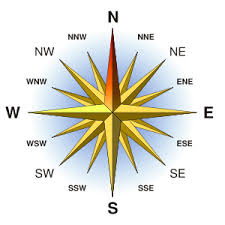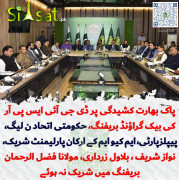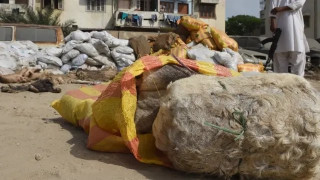بسم اللہ الرحمٰن الرحیم
@cheeko
cutting and pasting master you have posted the same post 100 times or more...and alhamdulillah i have answered to your article regarding Hadeeth of Najd....This Najd is infact "Iraq" which is also evident from the understanding of Sahaba please read again and again the following hadeeth..you dont need to paste the whole article...there were 14 different Najds at the time of Prophet Muhammad Sallal Laahu Alaih Wasallam and Iraq was one of the Najds as well as Najd of Saudia.
Read the following Hadeeth first:
Reported in al-Bukhaaree [Book of Trials, Chpt. 'The afflictions will come from the East' 9/166 no. 214 Eng. Trans]
The Messenger of Allaah, sallallaahu alayhi wa sallam, said,
"O Allaah bestow your blessings on our Shaam. O Allaah bestow your blessings on our Yemen." The people said, "O Messenger of Allaah, and our Najd." I think the third time the Prophet, sallallaahu alayhi wa sallam, said, "There (in Najd) will occur earthquakes, trials and tribulations, and from their appears the Horn of Satan."
Now Read the following Hadeeth:
Saheeh Muslim [4/1505 no.6943]
Saalim bin Abdullaah bin Umar said: O people of Iraaq, how strange is it that you ask about the minor sins but commit the major sins? [The killing of al-Husayn] I heard my father, Abdullaah bin Umar narrating that he heard the Messenger of Allaah, sallallaahu alayhi wa sallam, saying while pointing his hand to the east: "Indeed the turmoil would come from this side, from where appear the horns of Satan and you would strike the necks of one another..."
If you read all the Ahadeeth about Najd, East and Iraq you would come to know that wordings are almost same but in some Ahadeeth the word Najd is used and in some the word East and in some the word Iraq is used....so the combine understading of these Ahadeeth gives us the clear picture for NAJD as being Iraq.
Avoid showing unauthentic Hadees aur such bolo
The Chapter of Faith of Sahih Muslim
0084 It is narrated on the authority of Abu Huraira that the Messenger of Allah observed: There have come the people of Yemen; they are tender of hearts, the belief is that of the Yemenites, the understanding (of the faith) is that of the Yemenites and sagacity is that of the Yemenites.
0085 Abu Huraira reported the same hadith which is transmitted to us by another chain of transmitters, e. g. Muhammad b. al-Muthanna, Ishaq b. Yusuf Azraq, Ibn 'Aun, etc.
0086 Abu Huraira reported: The Messenger of Allah (may peace and blessings be upon him) observed: There came to you the people from Yemen; they are tender of hearts and mild of feelings, the understanding is Yemenite, the sagacity is Yemenite.
0087 It is narrated on the authority of Abu Huraira that the Messenger of Allah (may peace and blessings be upon him) remarked: The summit of unbelief is towards the East and the pride and conceitedness is found among the owners of horses and camels who are rude and uncivil, people of the tents, and tranquillity is found among those who rear goats and sheep.
0088 It is narrated on the authority of Abu Huraira that the Messenger of Allah (may peace and blessings be upon him) observed: The belief is among the Yemenites, and the unbelief is towards the East, and tranquillity is among those who rear goats and sheep, and pride and simulation is among the uncivil and rude owners of horses and camels.
0089 It is reported on the authority of Abu Huraira: I heard the Messenger of Allah saying this: Pride and conceitedness is found among the uncivil owners of the camels and tranquillity is found among the owners of sheep and goats.
0090 The same hadith has been narrated by Zuhri with the same chain of authorities with the addition: The belief is among the Yemenites, the sagacity is that of the Yemenites.
0091 Abu Huraira said: I heard the Prophet (may peace and blessings be upon him) saying: There came the people of Yemen, they are tender of feelings and meek of hearts. The belief is that of the Yemenites, the sagacity is that of the Yemenites, the tranquillity is among the owners of goats and sheep, and pride and conceitedness is among the uncivil owners of the camels, the people of the tents in the direction of sunrise.
0094 Shu'ba narrated the hadith as reported by Jarir with the same chain of narrators with this addition: Pride and conceitedness is among the owners of the camels and tranquillity and sobriety is found amongst the owners of sheep.
0095 It is reported on the authority of Jabir b. Abdullah that the Messenger of Allah (may peace and, blessings be upon him) observed: The callousness of heart and sternness is in the East and faith is among the people of the Hijaz.
'The Chapter of Zakat (Kitab Al-Zakat)' of Sahih Muslim
2335 Abu Dharr reported Allah's Messenger (may peace be upon him) as saying: Verily there would arise from my Ummah after me or soon after me a group (of people) who would recite the Qar'an, but it would not go beyond their throats, and they would pass clean through their religion just as the arrow passes through the prey, and they would never come back to it. They would be the worst among the creation and the creatures. Ibn Samit (one of the narrators) said: I met Rafi' b. 'Amr Ghifari, the brother of Al-Hakam Ghifari and I said: What is this hadith that I heard from Abu Dharr, i. e. so and so? -and then I narrated that hadith to him and said: I heard it from the Messenger of Allah (may peace be upon him).
2336 Yusair b. 'Amr reported that he inquired of Sahl b. Hunaif: Did you hear the Apostle of Allah (may peace be upon him) making a mention of the Khwarij? He said: I heard him say (and he pointed with his hand towards the east) that these would be a people who would recite the Qur'an with their tongues and it would not go beyond their collar bones. They would pass clean through their religion just as the arrow passes through the prey.
2337 This hadith had been transmitted by Sulaiman Shaibani with the same chain of narrators (and the words are)," There would arise out of (this group) many a group"
2338 Sahl b. Hunaif reported Allah's Apostle (may peace be upon him) as saying: There would arise from the east a people with shaven heads.
Sahih Bukhari Chapter 88
212 Narrated Salim's father: The Prophet stood up beside the pulpit (and pointed with his finger towards the East) and said, "Afflictions are there! Afflictions are there, from where the side of the head of Satan comes out," or said, "..the side of the sun.."
213 Narrated Ibn 'Umar: I heard Allah's Apostle while he was facing the East, saying, "Verily! Afflictions are there, from where the side of the head of Satan comes out."
214 Narrated Ibn 'Umar: The Prophet said, "O Allah! Bestow Your blessings on our Sham! O Allah! Bestow Your blessings on our Yemen." The People said, "And also on our Najd." He said, "O Allah! Bestow Your blessings on our Sham (north)! O Allah! Bestow Your blessings on our Yemen." The people said, "O Allah's Apostle! And also on our Najd." I think the third time the Prophet said, "There (in Najd) is the place of earthquakes and afflictions and from there comes out the side of the head of Satan."
Malik Muwatta
Book 54:
Malik related to me from Abdullah ibn Dinar that Abdullah ibn Umar said, "I saw the Messenger of Allah, may Allah bless him and grant him peace, pointing at the east and saying, 'The cause of dissension is here. The cause of dissension is here, from where the helpers of shaytan arise.' "
Book 54:
Malik related to me from Abu'z-Zinad from al-Araj from Abu Hurayra that the Messenger of Allah, may Allah bless him and grant him peace, said, "The head of kufr is towards the east. Boasting and price is among people who have horses and camels. The loud-voiced people are the people of tents (the Bedouins). Tranquillity is with the people who have sheep."
I will tell you some more Hadees which clear about Mudar and Rabia tribe and there subtribes like Bani Tamim. You want me to tell which Wahabee is from subtribe of Mudar or you find will yourself.
Sahih Bukhari chapter 55 number 600
Narrated Abu Huraira: Allah's Apostle said, "O Allah! Save Aiyyash bin Abi Rabia (from the unjust treatment of the infidels). O Allah! Save Salama bin Hisham. O Allah! Send your Punishment on (the tribe of) Mudar. O Allah! Let them suffer from years (of drought) similar to that inflicted during the life-time of Joseph."
Sahih Bukhari chapter 56 number 702
Narrated Abi Mas'ud: The Prophet said, "From this side from the east, afflictions will appear. Rudeness and lack of mercy are characteristics of the rural bedouins who are busy with their camels and cows (and pay no attention to religion). Such are the tribes of Rabi'a and Mudar."
Sahih Bukhari chapter 56 number 719
Narrated Abu Bakra: Al-Aqra' bin Habis said to the Prophet "Nobody gave you the pledge of allegiance but the robbers of the pilgrims (i.e. those who used to rob the pilgrims) from the tribes of Aslam, Ghifar, Muzaina." (Ibn Abi Ya'qub is in doubt whether Al-Aqra' added. 'And Juhaina.') The Prophet said, "Don't you think that the tribes of Aslam, Ghifar, Muzaina (and also perhaps) Juhaina are better than the tribes of Bani Tamim, Bani Amir, Asad, and Ghatafan?" Somebody said, "They were unsuccessful and losers!" The Prophet said, "Yes, by Him in Whose Hands my life is, they (i.e. the former) are better than they (i.e. the latter)." Abu Huraira said, "(The Prophet said), '(The people of) Bani Aslam, Ghifar and some people of Muzaina (or some people of Juhaina or Muzaina) are better in Allah's Sight (or on the Day of Resurrection) than the tribes of Asad, Tamim, Hawazin and Ghatafan.' "
Sahih Bukhari chapter 54 number 413
Narrated 'Imran bin Husain: Some people of Bani Tamim came to the Prophet and he said (to them), "O Bani Tamim! rejoice with glad tidings." They said, "You have given us glad tidings, now give us something." On hearing that the color of his face changed then the people of Yemen came to him and he said, "O people of Yemen ! Accept the good tidings, as Bani Tamim has refused them." The Yemenites said, "We accept them. Then the Prophet started taking about the beginning of creation and about Allah's Throne. In the mean time a man came saying, "O 'Imran! Your she-camel has run away!'' (I got up and went away), but l wish I had not left that place (for I missed what Allah's Apostle had said).
Sahih Muslim chapter 1 number 83
It is narrated on the authority of Ibn Mas'ud that the Apostle of Allah (may peace and blessings be upon him) pointed towards Yemen with his hand and said: Verily Iman is towards this side, and harshness and callousness of the hearts is found amongst the rude owners of the camels who drive them behind their tails (to the direction) where emerge the two horns of Satan, they are the tribes of Rabi'a and Mudar.
Many a times we meet ignorant wahabis in life who say that NAJD is Iraq. This statement ensures that the person has been reading Wahabi FABRICATED materials and has been brain washed by the wahabi speakers.
If one does not have interest in reading , please analyse these evidence.
FIRST PROOF
The etymological sense of the Arabic word najd, which means ‘high ground’. Again, a brief consultation of an atlas resolves this matter decisively. With the exception of present-day northern Iraq, which was not considered part of Iraq by any Muslim until the present century (it was called ‘al-Jazira’), Iraq is notably flat and low-lying, much of it even today being marshland, while the remainder, up to and well to the north of Baghdad, is flat, low desert or agricultural land. Najd, by contrast, is mostly plateau, culminating in peaks such as Jabal Tayyi’ (1300 metres), in the Jabal Shammar range.
SECOND PROOF
Medieval Islamic geographers contest this inherently strange thesis (see for instance Ibn Khurradadhbih, al-Masalik wa’l-mamalik [Leiden, 1887], 125; Ibn Hawqal, Kitab Surat al-ard [Beirut, 1968],18); and limit the northern extent of Najd at Wadi al-Rumma, or to the deserts to the south of al-Mada’in. There is no indication that the places in which the second wave of sedition arose, such as Kufa and Basra, were associated in the mind of the first Muslims with the term ‘Najd’. On the contrary, these places are in every case identified as lying within the land of Iraq.
THIRD PROOF
Even the briefest glimpse at a modern atlas will show that a straight line drawn to the east of al-Madina al-Munawwara does not pass anywhere near Iraq, but passes some distance to the south of Riyadh; that is to say, through the exact centre of Najd. The hadiths which speak of ‘the East’ in this context hence support the view that Najd is indicated, not Iraq.
The coordinates of Medinah is 2433N 03942E.
Najd/Riyadh is 2443N 04644E
Notice almost the same latitude of Najd/Riyadh and Medinah - i.e. 24xx.
The latitude of the towns in Iraq are 3040N (Basrah) and 3340N (Baghad).
Therefore Iraq is North or North-North East of Medinah rather East


FOURTH PROOF
Here is a clear proof that our beloved prophet CLEARLY meant , knew and told that NAJD is DIFFERENT FROM IRAQ. Please Analyse this
Confirmation of this identification is easily located in the hadith literature, which contains numerous references to Najd, all of which clearly denote Central Arabia. To take a few examples out of many dozens: there is the hadith narrated by Abu Daud (Salat al-Safar, 15), which runs: ‘We went out to Najd with Allah’s Messenger (s.w.s.) until we arrived at Dhat al-Riqa‘, where he met a group from Ghatafan [a Najdite tribe].’ In Tirmidhi (Hajj, 57), there is the record of an encounter between the Messenger (s.w.s.) and a Najdi delegation which he received at Arafa (see also Ibn Maja, Manasik, 57). In no such case does the Sunna indicate that Iraq was somehow included in the Prophetic definition of ‘Najd’.
Further evidence can be cited from the cluster of hadiths which identify the miqat points for pilgrims. In a hadith narrated by Imam Nasa’i (Manasik al-Hajj, 22), ‘A’isha (r.a.) declared that ‘Allah’s Messenger (s.w.s.) established the miqat for the people of Madina at Dhu’l-Hulayfa, for the people of Syria and Egypt at al-Juhfa, for the people of Iraq at Dhat Irq, and for the people of Najd at Qarn, and for the Yemenis at Yalamlam.’ Imam Muslim (Hajj, 2) narrates a similar hadith: ‘for the people of Madina it is Dhu’l-Hulayfa - while on the other road it is al-Juhfa - for the people of Iraq it is Dhat Irq, for the people of Najd it is Qarn, and for the people of Yemen it is Yalamlam.’
Book 007, Number 2666: Sahih Muslim
Abu Zubair heard Jabir b. 'Abdullah (Allah be pleased with them) as saying as he was asked about (the place for entering upon the) state of Ihram: I heard (and I think he carried it directly to the Apostle of Allah) him saying: For the people of Medina Dhu'l-Hulaifa is the place for entering upon the state of Ihram, and for (the people coming through the other way, i. e. Syria) it is Juhfa; for the people of Iraq it is Dbat al-'Irq; for the people uf Najd it is Qarn (al-Manazil) and for the people of Yemen it is Yalamlam.
The following hadith is from Sahih Bukhari:
Narrated ‘Abdullah bin Dinar:
Ibn ‘Umar said, “The Prophet fixed Qarn as the Miqat (for assuming the Ihram) for the people of Najd, and Al-Juhfa for the people of Sham, and Dhul-Hulaifa for the people of Medina.” Ibn ‘Umar added, “I heard this from the Prophet, and I have been informed that the Prophet said, ‘The Miqat for the Yemenites is Yalamlam.’ “When Iraq was mentioned, he said, “At that time it was not a Muslim country.” [Sahih Bukhari Volume 9, Book 92, Number 443]
Najd in the Hadith
There are many hadiths in which the Messenger (s.w.s.) praised particular lands. It is significant that although Najd is the closest of lands to Makka and Madina, it is not praised by any one of these hadiths. The first hadith cited above shows the Messenger’s willingness to pray for Syria and Yemen, and his insistent refusal to pray for Najd. And wherever Najd is mentioned, it is clearly seen as a problematic territory. Consider, for instance, the following noble hadith:
Amr ibn Abasa said: ‘Allah’s Messenger (s.w.s.) was one day reviewing the horses, in the company of Uyayna ibn Hisn ibn Badr al-Fazari. [...] Uyayna remarked: “The best of men are those who bear their swords on their shoulders, and carry their lances in the woven stocks of their horses, wearing cloaks, and are the people of the Najd.” But Allah’s Messenger (s.w.s.) replied: “You lie! Rather, the best of men are the men of the Yemen. Faith is a Yemeni, the Yemen of [the tribes of] Lakhm and Judham and Amila. [...] Hadramawt is better than the tribe of Harith; one tribe is better than another; another is worse [...] My Lord commanded me to curse Quraysh, and I cursed them, but he then commanded me to bless them twice, and I did so [...] Aslam and Ghifar, and their associates of Juhaina, are better than Asad and Tamim and Ghatafan and Hawazin, in the sight of Allah on the Day of Rising. [...] The most numerous tribe in the Garden shall be [the Yemeni tribes of] Madhhij and Ma’kul.’ (Ahmad ibn Hanbal and al-Tabarani, by sound narrators. Cited in Ali ibn Abu Bakr al-Haythami, Majma‘ al-zawa’id wa manba‘ al-fawa’id [Cairo, 1352], X, 43).
But other hadiths in praise of other lands abound. For instance:
Umm Salama narrated that Allah’s Messenger (s.w.s.) gave the following counsel on his deathbed: ‘By Allah, I adjure you by Him, concerning the Egyptians, for you shall be victorious over them, and they will be a support for you and helpers in Allah’s path.’ (Tabarani, classed by al-Haythami as sahih [Majma‘, X, 63].) (For more on the merit of the Egyptians see Sahih Muslim, commentary by Imam al-Nawawi [Cairo, 1347], XVI, 96-7.)
Qays ibn Sa‘d narrated that Allah’s Messenger (s.w.s.) said: ‘Were faith to be suspended from the Pleiades, men from the sons of Faris [south-central Iran] would reach it.’ (Narrated in the Musnads of both Abu Ya‘la and al-Bazzar, classified as Sahih by al-Haythami. Majma‘, X, 64-5. See further Nawawi’s commentary to Sahih Muslim, XVI, 100.)
Allah’s Messenger said: ‘Tranquillity (sakina) is in the people of the Hijaz.’ (al-Bazzar, cited in Haythami, X, 53.)
On the authority of Abu’l-Darda (r.a.), the Messenger of Allah (s.w.s.) said: ‘You will find armies. An army in Syria, in Egypt, in Iraq and in the Yemen.’ (Bazzar and Tabarani, classified as sahih: al-Haythami, Majma‘, X, 58.) This constitutes praise for these lands as homes of jihad volunteers.
‘The angels of the All-Compassionate spread their wings over Syria.’ (Tabarani, classed as sahih: Majma‘, X, 60. See also Tirmidhi, commentary of Imam Muhammad ibn Abd al-Rahman al-Mubarakfuri: Tuhfat al-Ahwadhi bi-sharh Jami‘ al-Tirmidhi, X, 454; who confirms it as hasan sahih.)
Abu Hurayra narrated that Allah’s Messenger (s) said: ‘The people of Yemen have come to you. They are tenderer of heart, and more delicate of soul. Faith is a Yemeni, and wisdom is a Yemeni.’ (Tirmidhi, Fi fadl al-Yaman, no.4028. Mubarakfuri, X, 435, 437: hadith hasan sahih. On page 436 Imam Mubarakfuri points out that the ancestors of the Ansar were from the Yemen.)
‘The people of the Yemen are the best people on earth’. (Abu Ya‘la and Bazzar, classified as sahih. Haythami, X, 54-5.)
Allah’s Messenger (s) sent a man to one of the clans of the Arabs, but they insulted and beat him. He came to Allah’s Messenger (s.w.s.) and told him what had occurred. And the Messenger (s) said, ‘Had you gone to the people of Oman, they would not have insulted or beaten you.’ (Muslim, Fada’il al-Sahaba, 57. See Nawawi’s commentary, XVI, 98: ‘this indicates praise for them, and their merit.’)
The above hadiths are culled from a substantial corpus of material which records the Messenger (s.w.s.) praising neighbouring regions. Again, it is striking that although Najd was closer than any other, hadiths in praise of it are completely absent.
This fact is generally known, although not publicised, by Najdites themselves. It is clear that if there existed a single hadith that names and praises Najd, they would let the Umma know. In an attempt to circumvent or neutralise the explicit and implicit Prophetic condemnation of their province, some refuse to consider that the territorial hadiths might be in any way worthy of attention, and focus their comments on the tribal groupings who dwell in Najd.
A further hadith concerning Tamim runs as follows:
On the authority of Imran ibn Husayn (r.a.): ‘A group of Tamimites came to the Prophet (s.w.s.), and he said: “O tribe of Tamim! Receive good news!” “You promise us good news, so give us something [money]!” they replied. And his face changed. Then some Yemenis came, and he said: “O people of Yemen! Accept good news, even though the tribe of Tamim have not accepted it!” And they said: “We accept.” And the Prophet (s.w.s.) began to speak about the beginning of creation, and about the Throne.’ (Bukhari, Bab al-Khalq, 1.)
The harsh waywardness of the Tamimi mentality documented in the Qur’an and Hadith casts an interesting light on the personality of Abu Jahl, the arch-pagan leader of Quraysh. Abu Jahl, with his fanatical hatred of the Prophet (s.w.s.), must have been shaped by the Tamimi ethic in his childhood. His mother, Asma’ bint Mukharriba, was of the tribe of Tamim. (al-Jumahi, Tabaqat Fuhul al-Shu‘ara, ed. Mahmud Shakir [Cairo, 1952], p.123.) He also married the daughter of ‘Umayr ibn Ma‘bad al-Tamimi, by whom he had his son, predictably named Tamim. (Mus‘ab ibn Abdallah, Nasab Quraysh [Cairo, 1953], p.312.)
An attribute recurrently ascribed to the Tamimites in the hadith literature is that of misplaced zeal. When they finally enter Islam, they are associated with a fanatical form of piety that demands simple and rigid adherence, rather than understanding; and which frequently defies the established authorities of the religion. Imam Muslim records a narration from Abdallah ibn Shaqiq which runs: ‘Ibn Abbas once preached to us after the asr prayer, until the sun set and the stars appeared, and people began to say: “The prayer! The prayer!” A man of the Banu Tamim came up to him and said, constantly and insistently: “The prayer! The prayer!” And Ibn Abbas replied: “Are you teaching me the sunna, you wretch?”’ (Muslim, Salat al-Musafirin, 6.)






































